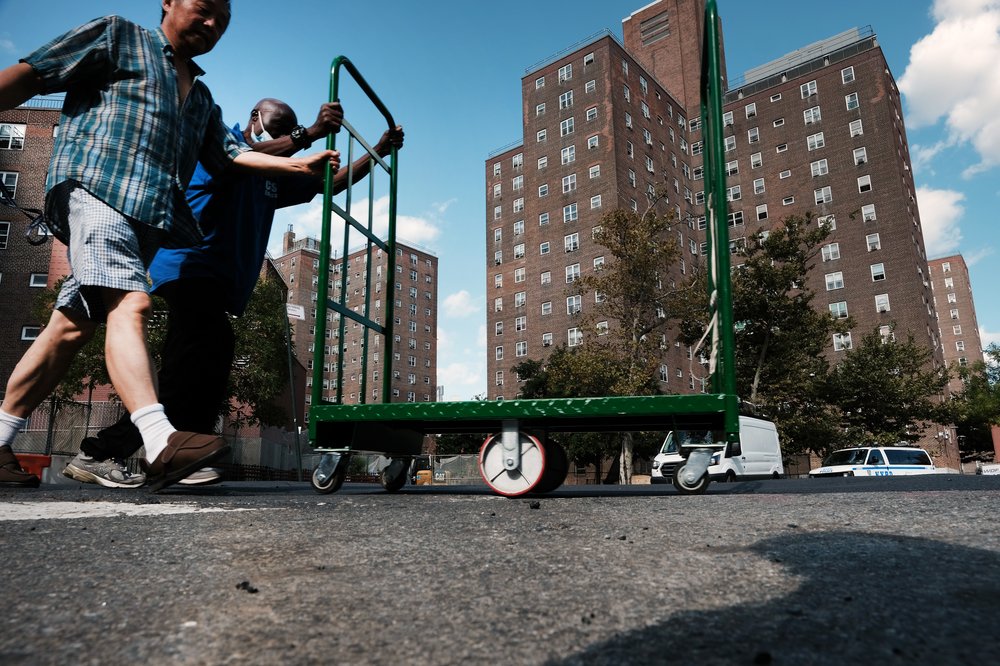Evictions rise at NYC public housing complexes under private management, report finds
Dec. 26, 2024, 11 a.m.
The city comptroller’s office found private managers sued to evict nearly 10% of tenants in public housing campuses they run last year.

The private companies that run dozens of New York City public housing campuses are evicting tenants at a much higher rate than the New York City Housing Authority, according to a report from the city comptroller’s office.
Auditors working for Comptroller Brad Lander found the eviction rate across roughly 16,000 NYCHA apartments run by private companies was more than double the rate in the rest of the public housing system during the last fiscal year, which ran from July 1, 2023 to June 30 of this year.
Auditors found the private companies evicted tenants from about one of every 200 apartments they run. In contrast, NYCHA evicted tenants from roughly one in every 866 apartments. Both numbers sat below the citywide eviction rate of about one in every 166 apartments.
The same private management companies started eviction proceedings against nearly one in 10 households living in those apartments during the 2023 calendar year, according to the report. Most of the cases were for nonpayment of rent and did not result in final evictions.
The New York City Housing Authority has turned 24,584 apartments at 69 campuses over to private managers through a program known as Permanent Affordability Commitment Together, or PACT. The arrangement changes the source of federal funding for each apartment to Section 8 vouchers, which come with more money; allows private companies to issue bonds and take out loans for renovations; and puts those companies in charge of repairs and rent collection.
Lander, who is running to unseat Mayor Eric Adams in next year’s Democratic primary, said tenants at other NYCHA campuses should know about the higher eviction rates before they vote on whether to enter the PACT program, opt in to a similar arrangement with more public control called the Preservation Trust or keep the status quo.
Residents, Lander said, must “have clear, accurate information about each potential pathway, which many residents told us they don’t have.”
He cautioned that the private managers weren’t doing enough to prevent evictions or to work out payment with tenants who owed back rent. The auditors found inconsistent outreach to tenants at risk of eviction and private managers taking tenants to court for as little as $250 in back rent.
“This audit provides valuable information – both for NYCHA to better oversee the PACT program, and for residents to be empowered to make decisions about the future of their housing,” he added.
NYCHA, the private companies running public housing and supporters of the arrangement have sought to quell fears about evictions and displacement since the program began in 2016. They say the number of evictions is still very low.
In a written statement to Gothamist, NYCHA spokesperson Michael Horgan slammed the findings and said the PACT program has already invested about $7 billion into public housing.
“In this report, the comptroller's office does not take into account NYCHA's financial and operational challenges and provides only a superficial assessment of the [housing] authority’s work with no substantive programmatic recommendations,” Horgan said. “The fact remains that there have been very few evictions under PACT, and the program upholds resident rights and protections and provides households with ongoing social services and financial assistance to resolve existing rental arrears.”
NYCHA and the private management companies “undoubtedly prioritize keeping New Yorkers housed, and any suggestion otherwise is misguided and false,” he added.
NYCHA estimates it needs roughly $78 billion to cover renovations, including lead remediation and boiler repairs, for its aging housing stock following decades of federal disinvestment. Earlier this month, a federal monitor praised the agency for making progress toward safer building conditions while noting “there is still much room for improvement.”
The public housing authority has turned to the private management model to address its budget gap by raising money the federal government will not issue. Unpaid rent dating back to the beginning of the pandemic has only compounded the NYCHA’s financial problems, though the state recently issued $185 million to cover back rent for thousands of tenants.
The auditors from the comptroller’s office reviewed eviction data at the PACT campuses using “monthly legal proceedings reports” that the companies submitted to NYCHA during the last two fiscal years.
The review includes the Hope Gardens complex, which spans 1,300 apartments in roughly 50 squat, three-story townhouses and another three high-rises in Bushwick. As Gothamist first reported, the developer picked to handle renovations at the campus fired the management company operating Hope Gardens after criticizing them for poor performance late last year.
The Hope Gardens eviction rate was 0.38%, lower than the PACT average.
In contrast, the eviction rate at the 722-unit Murphy and Baychester Houses was 1.52%. The Bronx development is run by the company C+C Management.
A spokesperson for C+C Management said the company forgives all rent arrears when it takes over a development and referred additional questions to NYCHA.
NYCHA tenants sue city, saying agency does not disclose rats, lead, other hazards NYC public housing residents fleeing domestic violence face lengthy waits, report finds